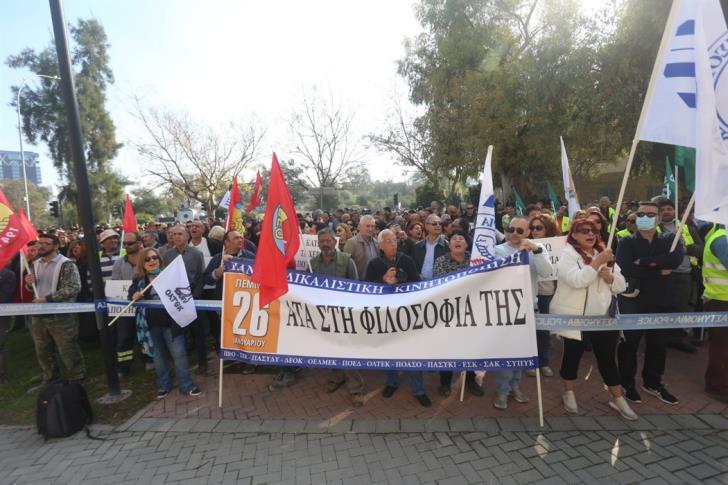Cyprus’ economy came to a standstill on Thursday during a three-hour general strike affecting the wider public sector in a dispute over the reinstatement of the inflation-linked Cost of Living Allowance as prices soar.
The strike by trade unions representing over 70,000 employees in the public and private sectors went on strike from noon and staged protests across the island.
It caused schools to shut down early; hospital emergency wards had skeleton staff, government departments to shut down, and public transport to stop.
In addition, around 22 flights and 4,000 passengers were affected at Larnaca and Paphos airports.
A strike was declared after mediation talks between trade unions, employers, and the government broke down, and a deadlock was declared.
Labour Minister Kyriakos Koushos said the dispute would have to be resolved by the next administration as presidential elections are scheduled for February 5, with a new government to be sworn in on March 1.
He said it was the unions’ responsibility to maintain industrial peace until then.
Unions vowed to escalate action depending on developments.
It is rare for a general strike to be called, but Cyprus is amid a cost of living crisis where 40-year high inflation rates have slashed purchasing power.
The Harmonised Index of Consumer Prices (HICP) rose 8.1% last year compared to 2021.
Trade unions argue that full restoration of the allowance is necessary to protect employee salaries and reject any effort to abolish it.
Employers say the CoLA system is antiquated, and after two years of a pandemic and a subsequent cost of living crisis, they are in no position to meet such pay demands.
Following the 2013 financial crisis, trade unions and employers signed a transitional agreement over the payment of COLA at 50% of the Consumer Price Index accounted for once a year instead of once every six months. The agreement was renewed until the end of 2022.
The agreement stipulated that if no new deal were reached, the previous agreement would continue to apply, something which trade unions reject.
“It is clear there is an orchestrated effort to deregulate labour relations in our country from employers and tolerance of the executive power,” said Sotiroula Charalambous, head of the left-wing trade union federation PEO.
“The message today should be resounding through the mass participation of workers, emphasising the importance of collective bargaining rights,” she added.
Employer federation director general Michalis Antoniou said only 20-25 in every 100 receive the allowance in the private sector.
“It’s a difficult day…after the elections, we need to sit down and find a compromise and look at how other countries apply the adjustment,” Antoniou told Sigma TV.
He said employers would pay the allowance due to workers where it applies.










